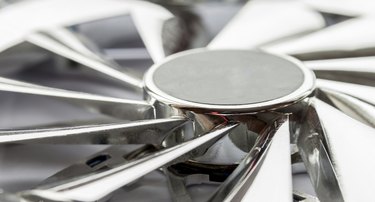
Your computer fans will generally regulate themselves, but if they are running at high speeds consistently or even when your computer is off, you will need to perform troubleshooting or adjust your settings to make sure your computer is working correctly. High temperatures can cause your fans to run faster to compensate, but you may also be experiencing a bugged process taking up your CPU or residual charges on your hardware.
Computer Running Hot
Video of the Day
If your fans are running all the time, even when your is computer idle or performing simple tasks, your computer may be overheating. This can sometimes be caused by dust clogging up your computer's case vents, preventing air circulation and keeping hot air inside. Use a can of compressed air to periodically clean the vents and make sure cool air can get in and hot air can escape. If possible, take off the side panel of your computer tower to help you get at more of the dust. Make sure your computer is operating in a cool room and that there are no obstructions on any sides that might prevent cool air from reaching your computer.
Video of the Day
Overclocking
While overclocking your computer can provide extra power, it also means your computer will generate more heat. This can put your computer at risk of damage if it is consistently running too hot. If overclocking your computer causes it to overheat, undo the process by resetting your hardware's parameters back to default. For example, if you overclocked your CPU, you can often reset it by going into your computer's BIOS and restoring the BIOS to factory defaults.
Heavy Processor Use
The more processing power your computer uses, the more heat it generates. If you are performing processor-intensive tasks, like playing games with high graphics settings or running a number of programs at once, your computer will got hotter, and your fans will run faster to compensate. If you don't have many programs open but your fans are still running hot, open Task Manager to see what processes are currently running; it's a possibility that a bugged process can be taking up a high percentage of your CPU. End any processes you no longer want running, but be careful not to end any important system processes.
Residual Circuit Board Charge
If your fans are running even after you've turned your computer off, the issue may be caused by a residual charge left on your motherboard. To troubleshoot this you will need to perform a cold boot. Turn off your computer completely, then unplug everything -- including the power cord -- from the tower. If you're working with a laptop, unplug the power cable and remove the battery. Press and hold the power button for 30 seconds, then plug everything back in and start your computer normally.
Fan Settings
Many of your fans are controlled by settings accessible in your BIOS. What you see when you access your BIOS will vary by computer model, so you may have to search a bit. You will not be able to control all your fans; case fans, for example, consistently run at the same speed. While you may not be able to edit precise speeds, you can lower the minimum and maximum fan speeds. Lowering your minimum speeds may help if your fans run too fast on a regular basis, since they may not be set to go any lower.